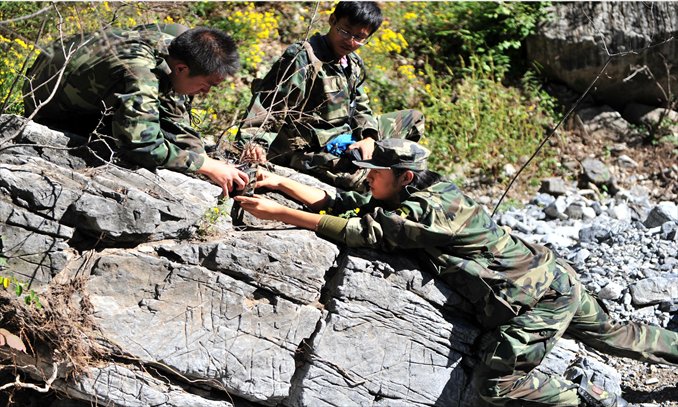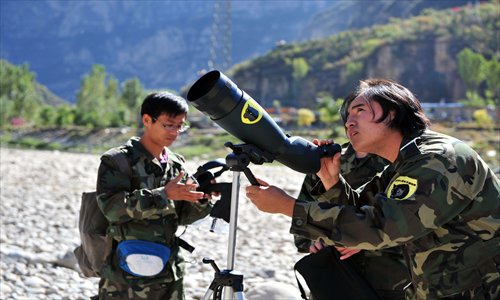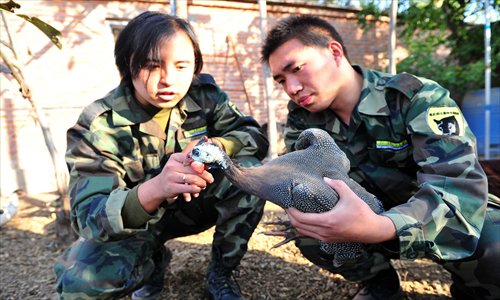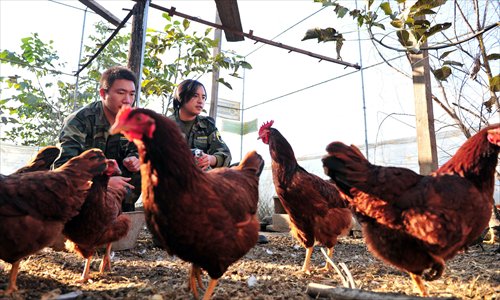Wild at heart
Source:Global Times Published: 2012-10-29 19:00:00

Li Li and his colleagues install an infrared camera used for observing wildlife. Photo: CFP
Led by a non-governmental wildlife protection organization, a team of 20 volunteers returned to Beijing on Monday evening after a six-day trip to Northeast China to check on flocks of migrating birds heading south.
"About a week from now, large flocks of various birds such as black storks and swans will reach Beijing. After a short break, they will continue on their way to South China," Li Li, founder of Black Leopard Wildlife Conservation Station (BLWCS), told the Global Times on Monday.
The team, made up of five workers from the station and 15 volunteers, left for Northeast China on October 23. They mainly checked the route of the migrating birds in order to ensure their safe arrival at the Beijing stop.
"A week from now, we will start toward the south, continuing to escort them as they reach their final destination: Poyang Lake in Jiangxi Province and Shangri-La in Yunnan Province," Li said.
Founded in 2000 in Beijing, the BLWCS is dedicated to protecting wildlife, mainly wild birds, in Beijing's suburbs. The station currently has 12 members in three monitoring offices, two in Fangshan and one in Yanqing, who all work on a voluntary basis.
As either veterinarians or wildlife experts, they often work on mountains, patrolling major wild animal habitats, fixing monitoring systems, observing their activities, and giving medical rescue to injured animals.
The workers also spread awareness of animal protection among the neighboring residents by holding small exhibitions or giving lectures in schools.
The efforts seem to be paying off. Statistics from the station showed that the number of black storks, a national first class protected bird, increased to 48 last year from just four 12 years ago in Yesanpo scenic area, about 100 kilometers from Beijing.
Villagers will also call the volunteers if they discover injured wild animals.
Born in a Beijing village in 1982, as a youngster, Li loved to catch birds as models for his paintings. "If I wanted to catch a bird, my chances of success were usually 60 percent," he said.
But at the age of 18, after finding most of the farmland was being replaced by buildings and animals at his birthplace were losing their habitats, he destroyed all the tools he had used to catch birds and pledged to devote his life to protecting wildlife.
Not long after, he established the station. Using earnings from selling his wildlife paintings, Li manages to cover the station's expenses of about 6,000 yuan ($962) a month.
Looking back on his 12 years of wildlife protection, Li is full of gratitude and confidence. "Five years ago, I planned to stop when I reached 40. But now, I want to do it for my whole life," he said.
Global Times
Led by a non-governmental wildlife protection organization, a team of 20 volunteers returned to Beijing on Monday evening after a six-day trip to Northeast China to check on flocks of migrating birds heading south.
"About a week from now, large flocks of various birds such as black storks and swans will reach Beijing. After a short break, they will continue on their way to South China," Li Li, founder of Black Leopard Wildlife Conservation Station (BLWCS), told the Global Times on Monday.
The team, made up of five workers from the station and 15 volunteers, left for Northeast China on October 23. They mainly checked the route of the migrating birds in order to ensure their safe arrival at the Beijing stop.
"A week from now, we will start toward the south, continuing to escort them as they reach their final destination: Poyang Lake in Jiangxi Province and Shangri-La in Yunnan Province," Li said.
Founded in 2000 in Beijing, the BLWCS is dedicated to protecting wildlife, mainly wild birds, in Beijing's suburbs. The station currently has 12 members in three monitoring offices, two in Fangshan and one in Yanqing, who all work on a voluntary basis.
As either veterinarians or wildlife experts, they often work on mountains, patrolling major wild animal habitats, fixing monitoring systems, observing their activities, and giving medical rescue to injured animals.
The workers also spread awareness of animal protection among the neighboring residents by holding small exhibitions or giving lectures in schools.
The efforts seem to be paying off. Statistics from the station showed that the number of black storks, a national first class protected bird, increased to 48 last year from just four 12 years ago in Yesanpo scenic area, about 100 kilometers from Beijing.
Villagers will also call the volunteers if they discover injured wild animals.
Born in a Beijing village in 1982, as a youngster, Li loved to catch birds as models for his paintings. "If I wanted to catch a bird, my chances of success were usually 60 percent," he said.
But at the age of 18, after finding most of the farmland was being replaced by buildings and animals at his birthplace were losing their habitats, he destroyed all the tools he had used to catch birds and pledged to devote his life to protecting wildlife.
Not long after, he established the station. Using earnings from selling his wildlife paintings, Li manages to cover the station's expenses of about 6,000 yuan ($962) a month.
Looking back on his 12 years of wildlife protection, Li is full of gratitude and confidence. "Five years ago, I planned to stop when I reached 40. But now, I want to do it for my whole life," he said.
Global Times

Li Li and his colleagues try to locate the nest of a black stork with a telescope. Photo: CFP

Li Li and another volunteer examine a rare bird rescued by the station. Photo: CFP

Li Li paints a picture of mountains where he usually goes on patrols. Photo: CFP

Li Li and his colleague with the chickens raised to feed the birds of prey the station has rescued. Photo: CFP
Posted in: China, In-Depth